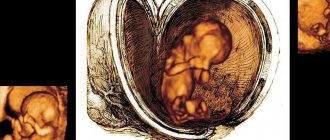Menstruation
Towards the end of each menstrual cycle, your body prepares for another egg to mature, which will happen in about two weeks. The lining of the uterus is going to accept the egg if it is fertilized. And if this does not happen, the mucous membrane will be renewed during your next period.
About you
So we've got a general idea of what happens in the first trimester of pregnancy and how it affects the entire 40 weeks. But what actually happens in your body and with your baby in the first few months? What can you do to support your baby during the first weeks and create the best conditions for his development?
Let's take a closer look at the first week when everything is just getting started. And let’s figure out why it is no less important than any other subsequent one.
In the first week
You start your period, but the baby is nowhere near. The thing is, you're still a couple of weeks away from conceiving, but that doesn't mean you can just ignore those first seven days. You need to plan everything and prepare for the baby's conception.
Every time you menstruate, your body prepares itself for the possibility of pregnancy. There are many complex hormonal changes going on inside your body to support conception, which can occur in about two weeks. Therefore, doctors consider the first day of the menstrual cycle to be the starting point of the countdown to the expected date of birth. It may seem strange, but according to medical standards, the first 2 weeks (when a woman is not yet pregnant) are included in the gestational age.
Mark the day your period starts and the length of your cycle on your calendar. It's even better if you keep records for several months so you know exactly the length of your menstrual cycle. For most women, it is about 28 days, although a few days plus or minus is also normal. Understanding your own body rhythms will help you plan for conception and calculate the day on which you are most likely to become pregnant.
Changes in a woman's body
In the first week after conception, pregnancy practically does not manifest itself at all, but changes are already beginning to occur in the body. Over the next 9 months (40 weeks), they will become more and more noticeable: the body will begin to rebuild itself to ensure the embryo’s full and safe development. During pregnancy, the so-called functional systems “mother-fetus” and “mother-placenta-fetus” are formed [1], the ultimate goal of which is the birth of a healthy child. This mechanism is unique and has no analogues: it is not the embryo that adapts to the characteristics of the mother’s body, but the body that creates within itself an optimal environment for the development of the fetus. Even before conception, the processes occurring in a woman’s body during the menstrual cycle are aimed at preparing suitable conditions for fertilization of the egg. During a certain phase of the cycle, called ovulation, it is easiest to get pregnant: the cell is mature, all conditions are met.
Menstruation.
A woman's menstrual cycle is divided into several periods:
- menstruation, during which the endometrium lining the walls of the uterus separates and comes out along with the unfertilized egg. This happens if pregnancy did not occur during the previous cycle. With menstruation, the follicular phase of the ovaries begins. A dominant follicle is determined and developed, which will later give birth to a mature egg;
- The ovulatory phase begins approximately on the seventh day of the cycle and lasts about three days. During this time, the follicle reaches maturity and at the end of the phase ruptures, releasing an egg ready for fertilization;
- Ovulation is the process during which an egg is released from the follicle and descends from the ovary into the fallopian tube. This takes about an hour, the cell retains the ability to be fertilized for about another day;
- The luteal phase, which makes up the second half of the cycle, proceeds differently depending on whether fertilization has occurred or not. Either implantation of a fertilized egg occurs, or gradual death of the endometrium.
Conception.
Ovulation lasts a short time, and the egg’s ability to fertilize only lasts about a day or two. It is impossible to track this process on your own: some women talk about characteristic symptoms and even pain, but this is a very individual and unreliable indicator. Sometimes characteristic discharge (cervical mucus) and an increase in basal temperature can serve as a marker, but all these signs have an error and are not able to give accurate results. However, pregnancy can also occur if sexual intercourse occurs several days before ovulation: healthy sperm, entering the uterine cavity, remain viable for 3-4 days.
What's going on inside
Since the previous menstrual cycle did not end with pregnancy, the level of estrogen and progesterone decreases, and in the first week menstrual bleeding begins, during which the body, as unnecessary, gets rid of the inner layer of the uterus - the endometrium. It is to it that the fertilized egg is attached, and then the placenta is subsequently formed from it.
The most important hormone in the first obstetric week of pregnancy is follicle-stimulating hormone, or FSH, which, as its name suggests, stimulates the production of follicles in the ovaries. These are the “sacs” in which the eggs mature. At first there are several of them, but as the amount of FSH decreases, only one dominant follicle remains.
Fertilization will become possible a couple of weeks after the start of the cycle, during the period of ovulation, when the egg matures and is released from the follicle.
It is important!
- The sperm is able to reach the egg pushed into the fallopian tube in about 2 hours, after which fusion occurs.
- One sperm, the first to penetrate the membrane, merges with the egg, after which it becomes impenetrable to others. A zygote is formed - a cell from which the embryo will begin to develop.
Implantation of fertilized egg.
Over the next few days, under the influence of muscle contractions and cilia of the mucous membrane, the fertilized egg moves towards the exit of the fallopian tube, that is, to the uterus. Around the same period, the process of fragmentation begins: the cells of the zygote begin to divide, but its overall size does not increase, each subsequent cell becomes smaller than the previous one. Having descended into the uterus, the zygote reaches the blastocyst stage in a few days, after which it gets rid of the membrane and is implanted inside the endometrium - the lining of the uterine walls. Under the influence of the hormone progesterone, aimed at maintaining pregnancy, the endometrium becomes thicker and surrounds the fertilized egg on all sides. Implantation allows you to protect the embryo and additionally nourish it with the secretion produced by the endometrial glands. Several days usually pass from conception to implantation, and the countdown of the first embryonic week does not begin with it, but with the formation of the zygote.
Ovulation and conception
The day of the beginning of each menstruation is the start for preparing the body for the upcoming pregnancy. At this time, the old layer of the endometrium comes off and is replaced by a new one. It has a loose structure and is excellent for implanting an embryo.
Hormonal changes contribute to the maturation of the egg. This complex process begins in the early years, even at the moment of puberty of the girl. It is at this time that follicles begin to develop.
Each menstrual cycle, several follicles mature in the ovary. However, one of them is growing faster than the others. It is from this that an egg will be released during ovulation, ready for fertilization.
After ovulation occurs, a mature egg passes from the abdominal cavity into the fallopian tube. It is there that the female reproductive cell most often meets the sperm and conception occurs.
Ovulation occurs 12-16 days from the start of the menstrual cycle. But this process can happen a little earlier or a little later: on the 8th or even 19th day. That is why it is difficult to establish the exact date of birth of the future fetus. However, if partners are planning a pregnancy, the preparation process must be approached responsibly.
Preparing for conception
To make your pregnancy successful, it is better to prepare for it. Couples planning a child adjust their lifestyle in such a way that the processes in the body that promote conception proceed without interruption, and the likelihood of pregnancy increases.
Visit to the gynecologist.
A woman who is planning to conceive a child should be regularly monitored by a doctor. The specialist will conduct an examination, tell you if there are any problems in the body that should be eliminated before conception, and give recommendations for adjusting your lifestyle. If problems are observed, the doctor will identify their cause and prescribe treatment. However, the gynecologist is not the only specialist who needs to be visited during this period. It is advisable to check your health in several areas: pregnancy is a serious burden on the body. It is advisable to eliminate in advance factors that may interfere or harm during pregnancy. A man should also be examined: the quality of sperm is no less important for successful conception than the condition of a woman’s body.
Risks when flying
Lack of oxygen
During the flight, the oxygen concentration in the aircraft cabin decreases. This fact is associated with a lot of anxiety among pregnant women, who immediately picture in their heads terrible pictures of oxygen starvation of the child in the womb. The results of studies that studied the effect of relative hypoxia on the body of healthy pregnant women did not find any cause for concern: there were no deviations either in the gas composition of the mother’s blood or in the reactions of the fetus. So in modern science it is generally accepted that a slight decrease in blood oxygen saturation does not pose a danger to healthy pregnant women.
Pressure changes. Premature birth
Pregnant women are extremely sensitive to pressure changes - an inevitable phenomenon during a flight, especially noticeable during takeoff and landing. It is impossible to say with one hundred percent certainty how a woman will endure this. There is an opinion that a strong difference in atmospheric pressure can cause premature birth. However, there is no scientific evidence for this. Of course, premature birth is not uncommon, and it can happen on earth. But it is in the air that there will be no pediatric intensive care unit, a team of doctors and the ability to provide qualified assistance.
Blood stasis, venous disease and thrombosis
The formation of thrombosis - a blood clot in the veins of the legs - is the most serious danger to which pregnant women are exposed when sitting still during long flights. The risk of developing deep venous thrombosis in pregnant women is five times higher than the risk of developing it in non-pregnant women of approximately the same age. Pregnancy itself is a risk factor for venous thromboembolism, and prolonged sitting in an economy class seat clearly does not improve the situation. Therefore, you just need to follow the gynecologist’s simple recommendations.
Possible exposure to radiation
While we live somewhere near sea level, under a thick layer of atmosphere (it serves as a natural barrier to radiation), we annually receive a dose of radiation equal to two x-rays, which is considered safe. However, at the altitude where planes that do not aim to conquer space fly, the protective layer of the atmosphere is much lower than on the ground. Over the course of a year, aircraft pilots are exposed to almost the same amount of radiation as at facilities with increased radiation hazard. Therefore, it is better to minimize the number of flights during pregnancy.
Pregnant women who do not work as pilots should not panic.
Researchers believe that infrequent flights do not have a negative effect on the fetus. For example, during a transatlantic flight (which lasts at least seven hours), a person is exposed to 2.5 times less radiation than during a chest x-ray. As for radiation exposure, which is always scary to get when passing through metal detectors at the airport, there is no need to be nervous here at all. Airport employees claim that the frames' operation is based on only a weak magnetic field.
It is important!
- You should see a gynecologist regularly in order, firstly, to detect pregnancy in time, and secondly, to track and eliminate the slightest irregularities.
- You can ask your gynecologist what other doctors you should visit. Endocrine disorders, metabolic problems, excess or underweight can affect conception.
Taking vitamins.
If your body doesn't have enough nutrients, your chances of getting pregnant may decrease. In the case of severe vitamin deficiency or lack of weight, menstruation, and with it ovulation, simply does not occur, that is, fertilization is impossible.
Recommendation 3: Avoid long flights
Perhaps in the first trimester of pregnancy you will want to go on vacation to distant countries. For example, to Cuba, Sri Lanka, Tanzania. Vacations in exotic countries are of course good, but your health and the safety of your unborn baby should come first!
During a flight, there is a very large pressure drop, and how your body will bear this load is anyone’s guess. It is likely that everything will go fine, but some problems are possible:
- exacerbation of toxicosis;
- frequent urge to urinate;
- increased fatigue;
- problems with the digestive system;
- dizziness.
In addition, during a long flight you will be constantly sitting. And prolonged sitting can lead to lymphostasis - swelling of the soft tissues. In this regard, it is quite reasonable to replace long flights with shorter travel routes.
Before your flight, be sure to go to an appointment with an obstetrician-gynecologist, who will assess your condition and accurately answer the question: can you fly or not. If you have certain health problems, flying is contraindicated for pregnant women. For example, air travel is prohibited if you have severe anemia.
When going on holiday abroad, do not forget that in many countries in Europe and Asia there is a risk of contracting measles and rubella. And if you did not have measles or rubella as a child or did not complete the full course of vaccination against them, then if you become infected, you will face serious troubles. For example, infection with rubella in the first trimester increases the risk of miscarriage by 4 times.
It is important!
- There are ready-made vitamin and mineral complexes designed to increase the likelihood of conception. If no serious abnormalities requiring observation by a doctor are identified, you can use them.
- This point also applies to men: the state of the body directly affects the motility and viability of sperm, as a result of which they may lose the opportunity to reach the egg.
- If your doctor does not recommend vitamins in a particular case, it is better to listen to his words. It is also worth choosing supplements after consultation with a specialist.
Nutrition.
Problems leading to failure to conceive are often caused by insufficient or unhealthy nutrition. For pregnancy to occur, an optimal weight is necessary: a lack of it leads to inhibition of reproductive processes, an excess is harmful due to possible endocrine disorders.
Cystitis or early pregnancy?
Changes in hormonal levels affect all organs, including the bladder. At the same time, the amount of mucus produced in the vagina of the expectant mother increases, which is why bacteria can enter the urethra. The intensity of blood flow in the pelvic area increases, so the woman feels pain just above the pubis and frequent urges.
If other symptoms of cystitis - cloudy color, blood in the urine - are absent, discomfort may be a sign of pregnancy. Do a test to be sure.
It is important!
- Protein is needed for normal sperm viability and motility, so it is important for a man to monitor the amount in his diet. The female body must also receive enough proteins: this is a building material for the body.
- It is important to control the amount of fat. Both a lack and excess of fats in the diet can affect hormonal levels. It is worth observing the golden mean.
- It is better for both men and women to avoid foods containing large amounts of chemical additives, as well as alcohol.
Physical exercise.
Physical inactivity harms all systems of the body, including reproductive. Moderate physical activity is indicated to improve metabolism, which in turn increases the likelihood of conception. Of course, excessive fanaticism, as in the case of nutrition, is inappropriate: excessive overload will only harm the body and reduce the likelihood of getting pregnant. It is necessary to maintain a level of physical activity that does not cause serious stress to the body. This will allow:
- keep the body in good shape;
- normalize metabolism;
- strengthen muscles, which is especially important for successful pregnancy;
- improve sleep;
- increase libido.
The effect of physical activity on emotional well-being is also important. Stress reduces your chance of getting pregnant, and moderate activity is a good way to relieve it. It is recommended for both parents to reconsider their lifestyle: both the female and male reproductive systems will benefit from healthy exercise. If the couple has already practiced sports or fitness, they can continue, but avoiding overload.
IS IT POSSIBLE FOR PREGNANT WOMEN TO PASS A SCANNER DURING SECURITY SCREENING AT THE AIRPORT?
Only machines with X-ray radiation are dangerous - so you should find out what type of scanner is at the airport. If the device has the corresponding icon, then you must present the airport employee with a certificate of pregnancy and undergo other screening procedures.
However, modern machines at airports are not dangerous for pregnant women. “Modern airport scanners use a low-frequency electromagnetic field. This is not ionizing radiation; it does not harm the pregnant woman’s body or the baby, just like ultrasound,” says Natalya Badikova.
First signs of pregnancy
In the first week of pregnancy, as a rule, there are no sensations at all: there is no stomach yet, nothing hurts, movements begin when the fetus has already reached a respectable size. Women planning to conceive tend to be anxious about their well-being, so they may attribute the slightest changes to pregnancy. In fact, the main signs appear around the fourth or fifth obstetric week. These include:
- nausea in the morning;
- chest pain;
- delays and absence of menstruation;
- changes in figure (hormonal changes affect weight gain);
- changes in the genitals (swelling, color change, etc.).
The first month is considered the so-called critical period [2], during which the slightest influence can lead to a miscarriage, and the woman will not even know that she was pregnant. Therefore, the best thing that can be done in the early stages is not to be nervous and wait for signs to appear that will confirm or refute the assumptions that have appeared.
How does a woman feel?
No specific signs of pregnancy are observed at 1 obstetric week. All the woman’s sensations now are typical symptoms of regular menstruation:
- bloody issues;
- pulling in the lower abdomen;
- headache and lower back pain;
- The mammary glands enlarge and become engorged.
When menstruation ends, all these unpleasant symptoms will disappear. And we can talk about early signs of pregnancy itself in 2-3 weeks, after ovulation and conception, when hormonal changes in the body begin.
Methods for determining pregnancy
Methods to detect pregnancy at an early stage include tests, tests and ultrasound. The choice of method depends on the period: some are indicative only at certain stages.
Ultrasound.
Usually carried out after a visit to the gynecologist, if pregnancy is confirmed. It gives accurate results, is informative and is used as one of the main diagnostic methods. The study is routinely carried out several times to track the development of the fetus: for example, at 6 weeks during an ultrasound, you can hear the baby’s heartbeat [3]. For the first time, a gynecologist will refer you for this procedure only if other factors suggest pregnancy. An ultrasound examination can detect the fertilized egg and assess its size and condition. It is not recommended to use ultrasound as an independent method; the procedure is carried out in combination with other methods to obtain a complete picture of what is happening. Before carrying out it is necessary to contact a gynecologist.
Pregnancy test.
Many manufacturers offer affordable and easy-to-use tests that supposedly allow you to track pregnancy in the first days after conception. In fact, this is almost impossible before implantation of the fertilized egg: such tools become informative at least a week after conception. It is then that hCG, a pregnancy marker hormone, appears in the blood and urine. Before using the test you must:
- make sure the expiration date is current;
- follow the recommendations specified in the instructions.
It is important!
The method should be applied in the morning: this increases its reliability.
If there are gynecological diseases or errors in the procedure, it can give false results, and this must be remembered. If you have any doubts, it is recommended to consult a doctor. Blood for hCG.
Among all the analyses, this one is considered reliable and at the same time accessible. The hormone hCG (human chorionic gonadotropin) begins to be produced by the female body immediately after conception, but its level becomes noticeable about a week after implantation of the fertilized egg. Its concentration in the blood is higher than in the urine, which increases the information content of the analysis. As a rule, a gynecologist sends a patient for testing if there is a possibility that she is pregnant. The analysis can be carried out independently with the help of specialized medical centers, but it is recommended to do this under the supervision of a doctor - he will be able to analyze the results and give the patient a detailed answer about her condition. Diagnosis should be made no earlier than a week after the expected conception.
PLANE, CAR, TRAIN – WHAT IS SAFER FOR PREGNANT WOMEN?
Contrary to popular belief, an airplane is not at all the “riskiest” type of transport for pregnant women.
“Many people think that it is safest for pregnant women to travel by private car due to the fact that you can stop wherever you want. But that's not true. The way it shakes in a car, it doesn’t shake anywhere, not even on a train. Bumps, sudden braking, emergency situations on the road - all this has a very negative impact on the state of pregnancy. Plus, prolonged physical inactivity, motion sickness, the smell of gasoline - this can trigger a cascade of pathological reactions,” says Dr. Badikova.
As for the train, if it is a comfortable express, and especially if the journey is not long (3-4 hours, Sapsan), then it can be considered. We can also consider new double-decker Moscow-Sochi express trains. In other cases, especially if the train is old, with age-appropriate bathrooms, doctors recommend thinking about an airplane instead of a train.
Let's sum it up
Pregnancy is a complex and multi-level process, during which a whole new organism is formed from one cell. The early stages, despite the absence of symptoms, are especially important: even before conception, you should pay attention to your lifestyle, adjust your diet and see a doctor. Even if there are no signs in the first week, the processes occur rapidly, so the optimal solution for a woman expecting pregnancy is not to be nervous, monitor her condition and wait. Calmness and well-being of the mother are the most important conditions for the healthy and full development of the embryo, so take care of yourself, avoid stress and follow the doctor’s recommendations. After some time, tests and studies will help you understand whether pregnancy has actually occurred.
Useful tips for pregnant women
1 week of pregnancy is a very important time to start preparing for bearing a child, so you need to adhere to the following recommendations:
- Any toxic compounds should not be allowed to enter the body. To do this, you need to stop smoking, completely avoid drinking alcohol, and not take medications that can harm the embryo. You should definitely visit a doctor if there are signs of any illness.
- The pelvic area should not be exposed to X-rays. If the doctor talks about the need to perform such a study, you need to warn him about planning a pregnancy.
- It is necessary to minimize any emotional turmoil. When a woman’s work involves constant stress, she should think in advance about the possibility of changing her job or going on vacation. It is advisable to spend as much time as possible with your partner, building a trusting relationship with him. Sexual intercourse in the first week of pregnancy is not prohibited.
- You need to adhere to general recommendations for maintaining a healthy lifestyle: walk more, eat right, sleep the prescribed number of hours, strengthen your immune system, take vitamins.
- You should not contact people who are carriers of any infectious diseases. Any virus that enters the body of a pregnant woman can negatively affect the development of the embryo.
- When planning a pregnancy, you should definitely visit a doctor, especially if a woman has any chronic diseases. Sometimes an ultrasound and other tests are required.











